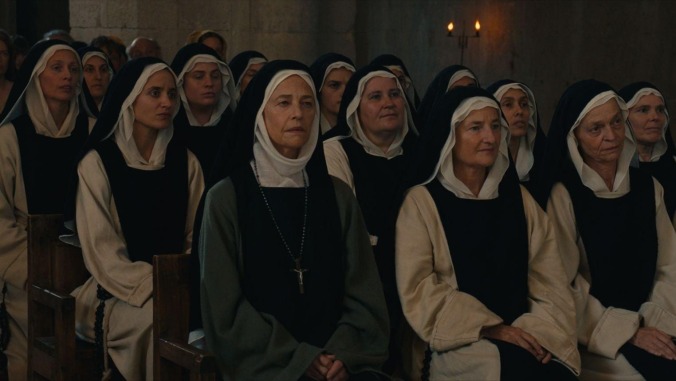Lesbian nun drama Benedetta is both profane and sublime—no wonder some Catholics hate it
Paul Verhoeven's controversial new film is as lurid but more spiritual than you've heard

Although church membership in the United States is at an all-time low—especially among Catholics—playing fast and loose with Christianity still has the power to shock a pious few. Take the American Society for the Defense of Tradition, Family and Property, which has condemned Benedetta as “pornographic filth” and “blasphemy against our spiritual Mother, the Holy Catholic Church.” The group has turned out small groups of protestors to early screenings of the film, clutching banners and lobbing Hail Marys at the heathens queued up outside the theater. Playing their role in this modern-day religious pageant, the heretics laugh and take selfies.
All of this must be terribly amusing to director Paul Verhoeven, whose last film, 2016’s Elle, was the kind of challenging arthouse fare that would seem to point toward a more cerebral phase of his career. Benedetta is both that Verhoeven and the Verhoeven who made Basic Instinct and Showgirls. Verhoeven co-wrote the script with Elle’s David Birke, using the book Immodest Acts: The Life Of A Lesbian Nun In Renaissance Italy as the jumping-off point for their own impish interpretation of the life of Benedetta Carlini, the abbess of a convent in 17th-century Italy who was prosecuted and imprisoned for an affair with one of her fellow brides of Christ.
But frottage—a.k.a. scissoring, which the historical record mentions specifically, and Verhoeven re-creates faithfully—was not Benedetta’s only affront to Renaissance decency. The film rides a provocative line by never quite clarifying whether Benedetta’s lifelong conviction that she’s been chosen by Jesus and the Virgin Mary is a real anointment by God, a fanatical delusion, or a cynical power play. For her part, Belgian movie star Virginie Efira plays the title character with complete conviction, whether she’s kneeling in awe before the Virgin Mary or being pleasured with a dildo carved out of a statue of the Blessed Mother.
A comedic prologue sets the tone with a sharp-tongued child and a conveniently timed splatter of bird shit, but the story really begins when a new initiate, Bartolomea (Daphne Patakia), arrives at the walled convent where Benedetta lives. A victim of abuse and incest, Bartolomea has no frame of reference for how to thank someone for being kind to her except to offer that person sexual gratification. And so, when Benedetta defends her and takes her under her wing, Bartolomea responds the only way she knows how.
But the sparks between the two women don’t test Benedetta’s faith. If anything, the relationship enhances her powers as a mystic, inspiring vivid dreams containing profound messages from God. The appearance of the stigmata on her hands and feet convince the majority of the nuns that this young sister is the real deal, and soon Benedetta has replaced the convent’s longtime abbess, Sister Felicita (Charlotte Rampling), as its leader.
Ecstatic visions, erotically charged regimes of punishment and penitence, and backroom Catholic politics ensue. There are those at the Theatine Convent of the Mother of God who think Benedetta is a sham. And given her confidence and charisma, it doesn’t take much for church officials like the corrupt Nuncio of Florence (Lambert Wilson) to sign on to this theory. So, who speaks for God? Benedetta? Sister Felicita? Nuncio, and the sadistic smile that creeps across his face when he puts poor Bartolomea to the rack?
The obvious touchstone for Benedetta is The Devils, Ken Russell’s still semi-blacklisted 1971 movie. These films tread similar ground in terms of themes and content: Both use historical events as inspiration for a furious condemnation of institutional hypocrisy, and both delight in the blasphemous commingling of religious and carnal ecstasy. (Both also have a scene of a nun kissing a bloodied, emaciated Christ on the cross—enough, on its own, to send legions of decency types into hysterics.) But Benedetta is a more earnest film in the sense that, at times, it plays like a glowing, pious Catholic drama about the lives of the saints—but with scenes from a ’70s nunsploitation movie cut in.
Verhoeven embraces the coarse earthiness of Renaissance peasant culture in Benedetta. Shortly after the bird-shit gag, a carriage taking young Benedetta to her new home at the convent passes a stage show where actors in skeleton costumes light their farts for a cheering crowd. Plague lingers in the background, a memento mori that brings a sense of urgency to the passions that drive the story. As in his WWII drama Black Book, Verhoeven applying his pulpier tendencies to historical drama in Benedetta plays like a defiant assertion of life—lusty, messy, wanton, animal life—in the face of overwhelming death and oppression.
This affirmation stirs the blood, to be sure. But it’s also the key to why those protestors are so upset. Mortification of the flesh is a key tenet of Christianity, declaring that one must deny one’s earthly needs and desires as much as possible in order to be worthy of God. Benedetta, a story about a nun who has both a close relationship with Jesus Christ and an active sex life, obviously contradicts this. More importantly, in the Catholic Church specifically, priests are necessary middle men who stand between the faithful and the divine. Benedetta doesn’t need men to talk to God for her, which, along with her brazen ambition, makes her an existential threat.
If Benedetta is a true saint—and this movie leaves that question open to interpretation—then queer sex is holy, and church hierarchy is parasitic and unnecessary. This, even more so than the Virgin Mary dildo, is what makes Benedetta dangerous. Although the Virgin Mary dildo doesn’t hurt.